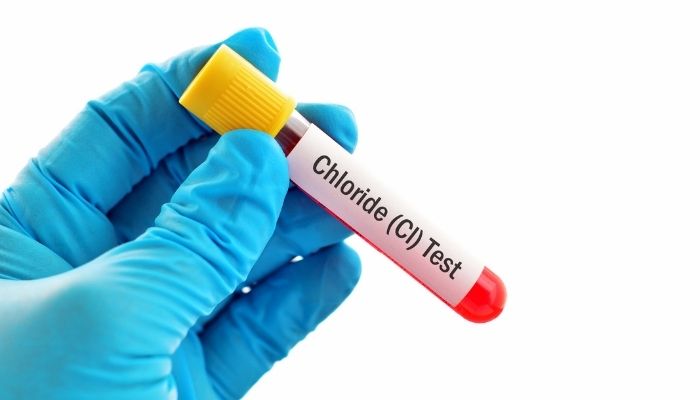A chloride blood test measures the chloride levels in the blood. Chloride is a vital electrolyte, playing its part in enabling better body fluid control and balancing bases and acids simultaneously. It maintains the pH balance in the body and the CL blood test takes place for measuring not just chloride but other electrolytes.

This test is done for the diagnosis and tracking of health conditions liake heart failures, kidney ailments, high blood pressure, and liver diseases. The other names for a chloride blood test include Serum Chloride and CI.
| Name of Test | Chloride Blood Test |
| Also known as | Serum Chloride, CI Test |
| Purpose of Test | Finding chloride levels in the body |
| Symptoms | Diarrhea, Vomiting, Weakness, Dehydration, Fatigue |
| Test Procedure | Blood sample collection through a needle |
| Cost | Rs. 155- 470 depending the city and lab |
| Also Included in | Health Insurance Plans |
Why is a Chloride Blood Test necessary?
The chloride blood test is mostly part of the regular blood tests done by people for checking overall health levels and conditions. If there are normal chloride levels, then you need not worry about anything. However, anything amiss will necessitate further testing and treatment. It is also helpful in the diagnosis of ailments/issues that are linked to fluid or acid imbalances within the body.When Is This Blood Test Required?
The doctor may have asked for a chloride blood test as a part of the overall electrolyte panel which is a routine procedure. This is a testing procedure that helps in measuring chloride and electrolytes such as sodium, potassium and also bicarbonate. You may also require this blood test in case of any symptoms of fluid or acid imbalances. These include vomiting for a lengthy duration, weakness, diarrhea, breathing trouble, dehydration and fatigue to name a few.Chloride Blood Test Procedure
Doctors will gather blood samples from the arm with the help of a tiny needle. After the insertion of the same, a small blood amount will be collected into a vial or test tube. You may feel a pinching or stinging sensation upon the needle going into the arm or coming out of it. The entire procedure will usually require just a few minutes.Is any specific preparation required for the chloride blood test?
No specific preparation is necessary for getting this blood test done or even the electrolyte panel. If the doctor has already asked for other types of blood tests, then you may have to fast (without drinking or eating) for a few hours beforehand. The doctor will always recommend specific instructions to you at all times.Risk Factors Involved
There are negligible risk factors for getting these tests done. You may only experience some bruising or pain at the site of the injection. The symptoms usually disappear on their own after some time. There are no other risk factors to consider in this scenario.Decoding the Test Results
Chloride figures may not always be in the normal threshold. The higher levels may indicate kidney ailments, dehydration, metabolic acidosis or an ailment where there is excessive acid within the blood. It may lead to vomiting, nausea, and even fatigue. Lower chloride levels may also indicate lung ailments, heart failures, and the Addison disease, a problem where the adrenal glands of the body do not generate sufficient varieties of hormones. It may lead to diverse symptoms like dizziness, weakness, dehydration and weight loss.Metabolic alkalosis is another ailment where there is excessive base within the blood. It may lead to twitching of the muscles, irritability, and a tingling sensation in the toes and fingers. If the chloride levels are not at normal, then it is not always an indicator of any medical issues which requires prompt treatment. Many aspects may impact the overall levels of chloride including drinking excessive fluids or losing fluids owing to diarrhea or vomiting in some cases as well. There are specific types of medicines like antacids that may also lead to erroneous results at the same time. You should always consult your doctor regarding the same.


